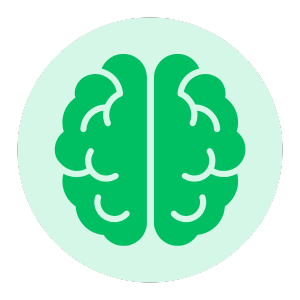ADHD Assessment Tool
Evaluate attention patterns and identify potential ADHD traits
This assessment helps identify potential traits associated with Attention-Deficit/Hyperactivity Disorder (ADHD). Please select the category that best describes you to begin the evaluation.
Male
ADHD assessment for adult males
Female
ADHD assessment for adult females
Child
ADHD assessment for children
Results are not a diagnosis - consult a healthcare professional for evaluation. © 2023
ADHD Assessment Results
Based on your responses, here is your ADHD profile
Key Characteristics
- Creative problem-solving
- High energy levels
- Ability to hyperfocus on interesting tasks
- Spontaneous and adaptable
- Difficulty maintaining focus
- Tendency to procrastinate
- Forgetfulness in daily activities
- Impulsive decision-making
Management Strategies
- Use planners and organizational apps
- Break tasks into smaller steps
- Create structured routines
- Minimize distractions in work areas
- Cognitive Behavioral Therapy (CBT)
- ADHD coaching
- Medication evaluation
- Support groups
Recommended Resources
- CHADD (Children and Adults with Attention-Deficit/Hyperactivity Disorder)
chadd.org | Provides education, advocacy and support - ADDitude Magazine
additudemag.com | Strategies and support for ADHD - National Institute of Mental Health
nimh.nih.gov | Research and information on ADHD
Understanding ADHD: Symptoms, Management, and Support
Comprehensive information about Attention-Deficit/Hyperactivity Disorder for children and adults
Attention-Deficit/Hyperactivity Disorder (ADHD) is a neurodevelopmental disorder that affects both children and adults. Characterized by patterns of inattention, hyperactivity, and impulsivity, ADHD can impact various aspects of life including work, relationships, and daily functioning. This comprehensive guide explores ADHD symptoms, diagnosis, treatment options, and management strategies.
Recognizing ADHD Symptoms
ADHD symptoms vary between individuals and can present differently in children versus adults. Common signs include difficulty sustaining attention, impulsivity, restlessness, and organizational challenges. Many adults seek an ADHD diagnosis after recognizing these persistent patterns in their lives.
Inattentive Symptoms
People with ADHD often struggle with focus, easily distracted by external stimuli or their own thoughts. They may have difficulty following through on tasks, organizing activities, and frequently lose items necessary for tasks. These challenges can lead to ADHD paralysis where individuals feel overwhelmed and unable to start or complete tasks.
Hyperactive-Impulsive Symptoms
Hyperactivity may manifest as fidgeting, excessive talking, or difficulty remaining seated. Impulsivity can appear as impatience, blurting out answers, or interrupting others. Some people wonder about behaviors like is rubbing your feet together a sign of ADHD - while not diagnostic, such restless movements can be associated with hyperactivity symptoms.
Diagnosis and Assessment
Proper diagnosis is essential for effective ADHD management. Assessments typically involve comprehensive evaluations by healthcare professionals such as an ADHD psychiatrist near me or specialized clinics. Tools like the Vanderbilt ADHD assessment help clinicians evaluate symptoms and their impact on daily functioning.
Did You Know?
ADHD is often comorbid with other conditions. Research shows connections between ADHD and PMDD (Premenstrual Dysphoric Disorder) in women, and many individuals with ADHD also experience ADHD social anxiety or ADHD burnout symptoms. Understanding these connections is crucial for effective treatment.
Treatment and Management Strategies
ADHD management typically involves a multimodal approach including medication, therapy, and lifestyle adaptations. Many people benefit from working with an adult ADHD therapist or exploring ADHD medication online options through telehealth services.
Medication Options
Stimulant medications are commonly prescribed for ADHD, but non-stimulant options are also available. It's important to monitor signs ADHD medication dose is too low which might include persistent symptoms or lack of improvement in focus and impulse control. Some individuals explore alternatives like modafinil for ADHD though this is an off-label use.
Therapeutic Approaches
CBT exercises for ADHD can help individuals develop coping strategies and organizational skills. Occupational therapy for ADHD focuses on practical daily living skills, while couples therapy for ADHD can address relationship challenges that may arise from ADHD symptoms.
Lifestyle and Accommodations
Many people with ADHD benefit from environmental adaptations like ADHD chairs that allow movement, organizational systems like an ADHD laundry system for men, and tools such as ADHD planner for adults. Technology can also help with apps for ADHD designed to improve focus and task management.
ADHD Across the Lifespan
ADHD manifests differently throughout life. Recognizing ADHD in babies is challenging but early signs may include extreme restlessness or sensitivity to stimuli. In adulthood, individuals often seek ADHD accommodations at work and may explore good jobs for people with ADHD that align with their strengths.
More Mental Health Assessments
Living Well with ADHD
ADHD presents unique challenges but also strengths like creativity, resilience, and the ability to think outside the box. Effective management involves understanding your specific symptoms, seeking appropriate treatment, and implementing strategies that work for your individual needs.
If you suspect you or a loved one might have ADHD, consider seeking evaluation from a qualified professional. With proper diagnosis and comprehensive treatment, individuals with ADHD can develop effective coping strategies and thrive in their personal and professional lives.
